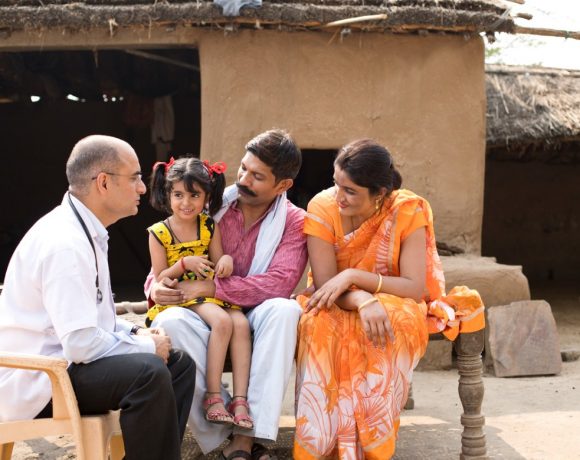- When one gets cancer, there are many different proteins that get mutated or hyper-activated or inactivated. Targeted therapy helps in identifying the most accurate drug that will control these proteins and bring them to normal function.
- AI could ease the process for pathologists to analyse a tissue biopsy – to analyse what protein causes what cancer – faster and efficiently. AI can also play a role in digging out data from genome sequencing – identifying the DNA mutations and alterations and power drug discovery.
- Clinical trials done on the Caucasian population do not serve as an accurate baseline for Indians and other Asians populations. There’s an initiative in India called Indigen: they try to sequence the healthy population, just to understand our baseline and establish a reference point. Based on these data, we can map out disease causing DNA alterations or mutations in Indian population.
This article was published in the April 2020 issue of InnoHealth Magazine.
With technology boosting the options to treat high risk diseases, how do we choose the best option? In my opinion, we need to look at it holistically – the newer methods and how we can use the newest technologies to improve their effectiveness. I will start with my specific area of expertise, targeted therapy. In simple terms, it is the right patients getting the right drug at the right time. When one gets cancer, there are many different proteins that get mutated or hyper-activated or inactivated. Targeted therapy helps in identifying the most accurate drug that will control these proteins and bring them to normal function. For example, at Cellestia, we develop first-in-class targeted therapy drugs for NOTCH-driven cancers. NOTCH is one of the proteins that causes cancer, which in its required measures help in tissue development and normal proliferation of the cells. But when you have too much NOTCH it not only induces cancer, but also causes the cancer to spread to other organs, which we call Metastasis. By activating the NOTCH pathway, cancers become resistant to drugs. This is a targeted therapy.
Another innovative way of cancer cure is Immunotherapy, which is boosting your own immunity to fight cancer. The work done by pioneers in this field like Carl Junes, is inspiring. In simple terms, it is taking your own immune cells, genetically engineering them in a way that they can start attacking tumour cells. But it’s still not enough. You still need to combine immunotherapy with targeted therapy to have a beneficial and sustainable outcome. And this is only one aspect of the treatment. We need every aspect to fall in place for effective cure. Before we start treating the patients, we need to effectively and precisely diagnose these patients. We need to know what kind of protein is driving this disease. For instance, before we put any patient on anti-NOTCH therapy, we need to know if the patient has activated NOTCH in his/her tumour. You can do gene sequencing, protein-based analysis and RNA analysis. This is a very critical part of personalised medicine. This is where AI can play a big role.
AI based diagnosis, drug discovery, targeted therapy and immunotherapy are immensely expensive. How do you make it affordable and accessible for the masses, especially in countries without a system of healthcare policies? This is where we need to look at decentralising drug development and creating drugs for the local population.
Aiming for faster, effective solutions
At the diagnostic level, AI could replace the human eye. It could ease the process for pathologists to analyse a tissue biopsy – to analyse what protein causes what cancer – faster and efficiently. AI can also play a role in digging out data from genome sequencing – identifying the DNA mutations and alterations. AI can power drug discovery. The traditional way drug discovery includes screening of compounds and making them work on cancer cells. This takes years of effort and investments, which needs to be validated by further testing. But with AI, you can do virtual screening and reduce the investments. You can target a protein that is causing cancer and run a library of a million virtual compounds. Without even synthesising them, AI can anticipate if the compound works on the protein or not. If it does, it will most likely even block its activity. You can thus minimise the number of tests, and save time and money. AI can also help in managing data that is pivotal in drug discovery.
Affordability – a key outcome of decentralisation of drug development
While these new technologies and methods bring in a spectrum of benefits, they also add huge costs to the healthcare system. AI based diagnosis, drug discovery, targeted therapy and immunotherapy are immensely expensive. How do you make it affordable and accessible for the masses, especially in countries without a system of healthcare policies? This is where we need to look at decentralising drug development and creating drugs for the local population. Right now, drug development is focused on the Western population. Everything we do is to meet the demands of bigger markets like the US, Canada and Europe. And all the clinical trials are done on the Caucasian population. Would this work as effectively, for the Indian population? One can’t be sure, as we may have a different genetic makeup. There should be more clinical trials done locally, while keeping the global standards in these trials. With rising healthcare costs, it’s important for India to develop strategies and incentivise drug discovery and development, to provide affordable and innovative medicine for the local population. For instance, China has a large population like India, with a considerably large ageing population. They can’t afford to import medicines worth millions of dollars. The Government has put this incentive in place for Chinese companies to develop drugs for the Chinese population. And they would develop drugs at five times less cost as in the US. This is just one example of how we can look at reducing cost and bringing benefits to the society, while maintaining international standards in drug development.
A lot of good early stage drug discoveries are made by India CROs. There’s demand for them from markets all over. But they do it just as a service. We are waiting for the day they will change their business models and say “we’re going to do drug development locally for the local population”. Of course, they will profit from creating expensive drugs for the global market. But if they can make affordable drugs locally, they will profit exponentially from the volume, as well as create avenues for effective treatments for our own societies. This is a huge market with great potential.
Imagine combining this with genomic data!
Currently with most of the clinical trials are done on the Caucasian population. They do not serve as an accurate baseline for Indians and other Asians populations. This is where we need to make tremendous progress. There’s an initiative in India called Indigen: they try to sequence the healthy population, just to understand our baseline and establish a reference point. Based on these data, we can map out disease causing DNA alterations or mutations in Indian population. And this know-how will help fuel the development of next generation personalised medicines. This knowledge gap in genomic sequencing is also a huge market opportunity that is almost untapped. The challenges lie in the legalities and genomic data privacy. You need to understand the local laws… how and what can you use this genomic data for, in an ethical manner. It’s pivotal to obtain this data for innovative treatment options, but it’s also important to strike a fine balance when it comes to the access to this data. A clear framework would help more innovators in the industry to follow this path. It is certain that these steps can create a huge impact in the field of personalised medicine in cancer treatment. We just need to strike the right balance between methodologies, technology and access to data.
Watch Dr. Raj Lehal share his thoughts on the medtech development and cancer care innovation in India –






NO COMMENT